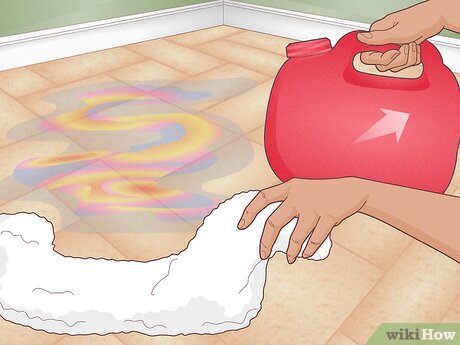A gasoline spill on your lawn mower can be a messy and potentially dangerous situation. It’s important to remember that gasoline is highly flammable and poses a risk of fire or explosion if not handled properly. This guide will walk you through the necessary safety precautions, cleanup procedures, and preventative measures to ensure your safety and protect the environment.
This article will cover the essential steps to take when dealing with a spilling gas on lawn mower, from assessing the severity of the spill to safely cleaning it up and preventing future occurrences. We’ll also discuss the environmental impact of gasoline spills and how to minimize harm.
Gasoline Spill Safety Precautions
Your safety is paramount when dealing with gasoline. Always prioritize caution and follow these essential safety precautions:
- Work in a well-ventilated area: Ensure adequate airflow to prevent the buildup of flammable vapors. Open windows and doors, or work outdoors if possible.
- Wear protective gear: This includes gloves, eye protection, and long sleeves to minimize skin contact with gasoline.
- Keep a fire extinguisher nearby: In case of an accidental ignition, have a readily accessible fire extinguisher rated for Class B fires (flammable liquids).
- Avoid smoking or open flames: Never smoke or use open flames near a gasoline spill. These can easily ignite flammable vapors.
Electrical Safety
Disconnect the spark plug wire from your lawn mower before handling any gasoline-related tasks. This prevents accidental engine starting and reduces the risk of electrical shock.
Assessing the Severity of a Gas Spill

The severity of a gasoline spill determines the appropriate cleanup approach:
- Small Spills: A few drops or a small puddle can often be cleaned up with absorbent materials like kitty litter, sawdust, or commercial spill kits.
- Moderate Spills: Larger spills may require more extensive cleanup procedures, including using specialized absorbents and potentially contacting a professional cleaning service.
- Major Spills: If the gasoline spill is significant, involving a large area or posing an immediate threat, evacuate the area and contact your local emergency services immediately.
Cleaning Up a Gasoline Spill on a Lawn Mower
Follow these steps to safely clean up a gasoline spill on your lawn mower:
- Ventilate the Area: Ensure good ventilation by opening windows, doors, or working outdoors. 2. Wear Protective Gear: Put on gloves, eye protection, and long sleeves to minimize skin contact with gasoline.
- Contain the Spill: Use absorbent materials like kitty litter, sawdust, or commercial spill kits to absorb the spilled gasoline. Avoid spreading the spill further.
- Remove Absorbent Material: Carefully collect the soaked absorbent material and dispose of it properly according to local regulations.
- Clean the Affected Area: Wipe down the affected area with a clean cloth dampened with soapy water. Rinse thoroughly with clean water and allow to air dry completely.
Disposal Considerations
Dispose of contaminated absorbent materials, rags, and any other waste generated during cleanup in accordance with your local hazardous waste disposal regulations.
Preventing Future Gasoline Spills

Take these preventative measures to minimize the risk of future gasoline spills:
- Use a Funnel: Always use a funnel when filling your lawn mower’s gas tank to prevent accidental spills.
- Check for Leaks: Regularly inspect your lawn mower for fuel line leaks or cracks in the gas tank. Repair any issues promptly.
- Store Gasoline Safely: Store gasoline in approved containers, away from heat sources and open flames. Keep containers tightly sealed.
- Maintain Your Lawn Mower: Proper maintenance, including keeping the engine tuned and air filter clean, can help prevent fuel system problems that may lead to spills.
Environmental Considerations
Gasoline is a harmful pollutant that can contaminate soil and water sources.
- Minimize Spills: Take all necessary precautions to prevent gasoline spills in the first place.
- Proper Cleanup: Follow safe cleanup procedures to contain and remove spilled gasoline effectively.
- Dispose Responsibly: Dispose of contaminated materials according to local regulations to minimize environmental impact.
Conclusion
Dealing with a spilling gas on lawn mower requires careful attention to safety and environmental responsibility. By following the guidelines outlined in this article, you can safely clean up any spills, prevent future occurrences, and protect yourself and the environment. Remember, when it comes to gasoline, always err on the side of caution.



